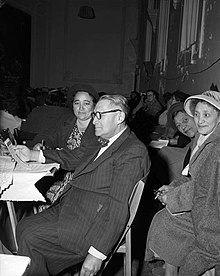Turi Carroll

Sir Alfred Thomas "Turi" Carroll KBE (24 August 1890 – 11 November 1975) was a New Zealand Māori leader and local politician. Through his life Carroll held many positions of leadership, including membership on the Kahungunu Tribal Executive, chairing the Wairoa County Council and presidency of the New Zealand Māori Council from 1962 to 67.
Carroll was born in Wairoa, Hawke's Bay, New Zealand on 24 August 1890, to Thomas Carroll and his wife Mako Kaimoana. He was a member of the Ngāti Kahungunu tribe, and the family farm, the 2,200-acre (890 ha) Huramua station outside Wairoa, was inherited through his paternal grandmother, Tapuke, who was of high rank within the tribe.
Turi's uncle, James Carroll, seeing potential in him and seeking an heir to his own endeavours, decided that Turi should be sent away for education. He attended Wanganui Collegiate for a year in 1905, before moving to Te Aute College. He studied at Lincoln Agricultural College from 1909, graduated in 1911, and returned to manage the family farm.
Carroll served in the New Zealand Expeditionary Force in World War I from 1917 to 1919.
Carroll was a Rotarian and prominent in the Anglican Church, and was chairman of the Wairoa County Council.[1]
Carroll was Maori vice-president of the National Party between 1948 and 1952, and unsuccessfully contested the Eastern Maori electorate for National in the 1949 and 1951 elections and the Southern Maori electorate for National in the 1954 election.[2]
In the 1952 Queen's Birthday Honours, Carroll was appointed an Officer of the Order of the British Empire, for services to the Māori race.[3] In 1953, he was awarded the Queen Elizabeth II Coronation Medal.[4]
In the 1962 Queen's Birthday Honours, Carroll was promoted to Knight Commander of the Order of the British Empire, for services to the Māori people.[5] The same month, June 1962, he was elected president of the New Zealand Māori Council of Tribal Executives (the council would become the New Zealand Māori Council the next year).
Carroll died on 11 November 1975 at Huramua station, near Wairoa. He was laid in state at the Taihoa marae before a funeral service at the Tākitimu marae. The procession of mourners following Carroll's hearse to his burial at the family cemetery was a mile long.
References
[edit]- ^ Gustafson, Barry (1986). The First 50 Years : A History of the New Zealand National Party. Auckland: Reed Methuen. p. 358. ISBN 0-474-00177-6.
- ^ Rorke, Jinty. "Turi Carroll". Dictionary of New Zealand Biography. Ministry for Culture and Heritage.
- ^ "No. 39557". The London Gazette (3rd supplement). 5 June 1952. p. 3050.
- ^ "Coronation Medal" (PDF). Supplement to the New Zealand Gazette. No. 37. 3 July 1953. pp. 1021–1035. Retrieved 17 April 2021.
- ^ "No. 42685". The London Gazette (3rd supplement). 2 June 1962. p. 4347.
- 1890 births
- 1975 deaths
- Māori politicians
- 20th-century New Zealand farmers
- Ngāti Kahungunu people
- People from Wairoa
- New Zealand military personnel of World War I
- New Zealand National Party politicians
- Unsuccessful candidates in the 1951 New Zealand general election
- Unsuccessful candidates in the 1949 New Zealand general election
- Local politicians in New Zealand
- People educated at Te Aute College
- Lincoln University (New Zealand) alumni
- Unsuccessful candidates in the 1954 New Zealand general election
- New Zealand Knights Commander of the Order of the British Empire
- Māori biography stubs
- New Zealand politician stubs
